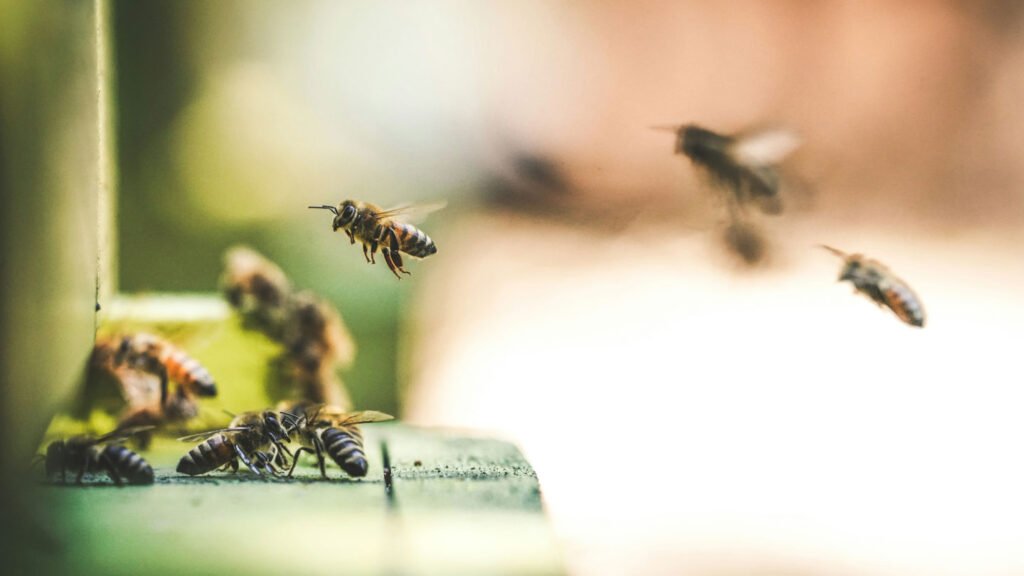The pollination of ground bees, including solitary bees, is necessary for maintaining the diversity and abundance of ecosystems. On the one hand, you may enjoy the benefits of their presence, such as helping control pests, if they use your garden as their nesting sites and not interfere with your planned outdoor activities.
However, their nests might discourage you from enjoying the garden and pose a risk of stings from wasps or bees if they stray from their nests. It cannot be missed that it must be done in a way that doesn’t lead to harming these beneficial insects.
Through this guide, we’ll be digging in how to get rid of ground bees in garden and unveiling several effective methods for creating a peace room in your farm where humans and the ground bees can coexist in harmony.
Understanding Ground Bees
The term ground bee refers to any bees that fall into the family Apidae, and unlike honey bees, which are social in nature, they are generally solitary insects.
The dig ground nesting animals generally pick sites of sandy or loose substrates from where they dig trenches and individual chambers to fertilize their eggs into.
The ground bees are important flower visitors in the gardens and even grasslands as they gather young for pollen and nectar. Unlike some stinging insects, the ground bees are not aggressive and they don’t usually sting unless they feel irritated by someone.
Natural Repellents And Barriers
To create the effect of a natural or organic pest control, dilute essential oils like peppermint or cloves and spray them around hotspots of ground bee existence.
The unnecessary amounts of these scents are unbearable to bees and therefore can prime them to look for other more suitable nesting places. Moreover, mulch or gravel may not be as suitable for growing grass plants.
With the help of the hostile place, you can repulse the ground bee from setting up of their colonies in your garden but not be at the same time chemical-free ecosystem.
Altering Garden Practices
Modifications of your gardening practices also provide a less harmful method of avoiding an intrusion from ground bees in all cases except chemical interventions.
As you keep the lawn well-swept by regular mowing, no spots of ground bees can be available as the homes. Bare earth is not beneficial for the bees because it is hard for them to create suitable burrows for their nests.
They would rather choose the area with soft soil as they have a unique ability to dig underground. Moreover, instead of open plantings, people should choose dense plantings as covering soil as well as the reduced nesting area is involved.
Providing Alternative Nesting Sites
When it comes to how to remove ground bees from garden, one of the useful solutions that can be implemented is the provision of alternative nesting places to relocate ground bees to low-traffic areas in your garden.
The purpose of placing bee houses or nesting boxes is to afford the solitary breast absolutely a lot of spots for nesting and far from the threatening areas.
Supplying alternative crops give the bees the option of avoiding your garden and help with the maintenance of required pollinator populations and variability that is essential for a biodiversity.
Professional Intervention
For temporarily removing ground bees during major occurrence or when the site reflects how to eradicate swarms, professional help is advised.
Professionals who deal with beekeeping or pest control can provide the necessary expert advice on heavenly solutions that are not dangerous for the ground bees population.
With professional assistance, the dispute is always coming to an end which prefer human safety and environment as well, providing environmentally sustainable relationship with these extensive pollinators.
Conclusion
Italic life zone in the garden corn requirement creation settlement zone sans vibration is a mix of comprehension, patience and of proactive measures.
Through the use of natural repellents along with changing the garden practices, giving space for alternative nesting, and looking for professional assistance whenever necessary you can effectively manage the basic species.
Through well-conceived strategies and ecological vigilance, you can respectably enjoy your garden and refuse pests’ presence. Thanks for that, you will maintain both human beings and pollinators’ lively environments.



